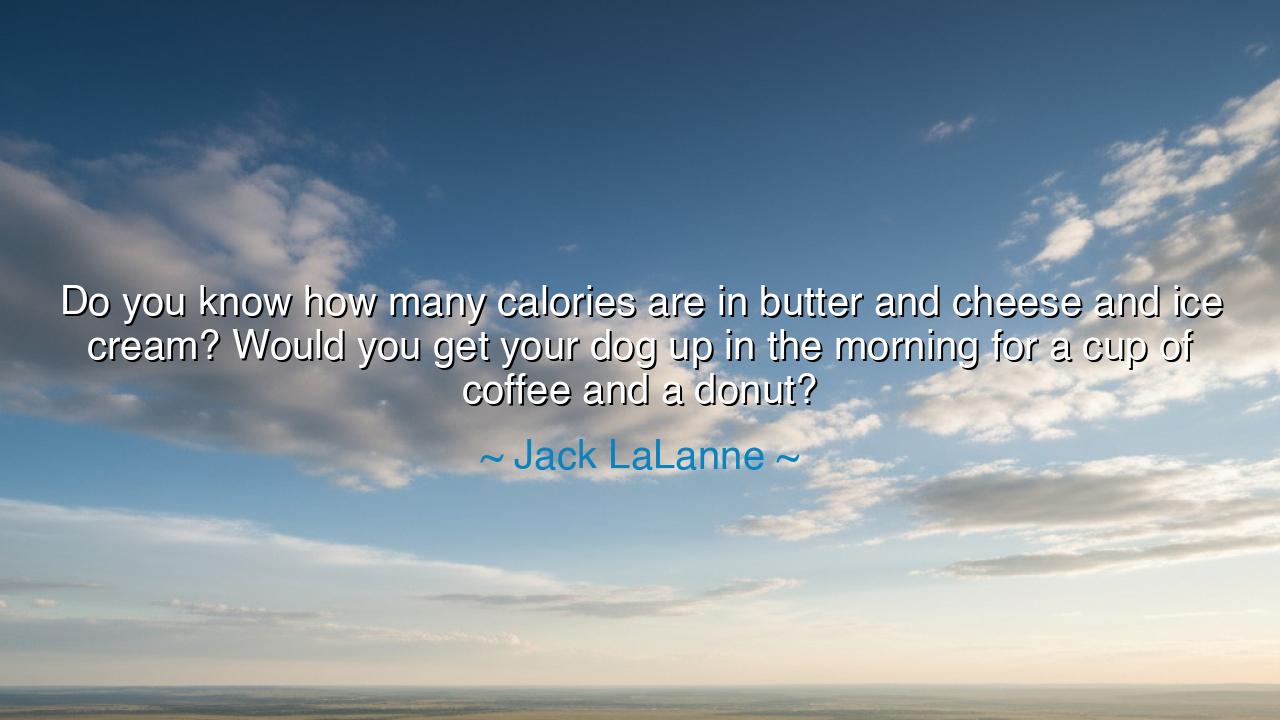
Do you know how many calories are in butter and cheese and ice
Do you know how many calories are in butter and cheese and ice cream? Would you get your dog up in the morning for a cup of coffee and a donut?






In the ancient wisdom of self-discipline, where the harmony of the body and mind is revered, the words of Jack LaLanne ring with urgency and clarity: "Do you know how many calories are in butter and cheese and ice cream? Would you get your dog up in the morning for a cup of coffee and a donut?" These words challenge us to examine not just the foods we consume but the choices we make every day. LaLanne is not merely speaking of food; he is speaking of our relationship with nourishment and the way we treat our bodies, reminding us that the choices we make have consequences that ripple through both our physical and mental health.
The ancient Greeks understood that the health of the body was essential to the strength of the mind. Socrates famously said, “Let food be thy medicine and medicine be thy food.” He recognized that what we consume directly impacts our ability to think clearly, live wisely, and lead well. LaLanne’s question about whether we would give our dog such unhealthy indulgences as a donut calls us to reflect on the choices we make not only for ourselves but also for those we love. Would we treat those we care for with the disrespect of feeding them food that undermines their well-being? To care for our bodies, as Socrates and the ancients taught, is to give it the nourishment it truly needs—a diet that sustains, fortifies, and enriches, rather than weakens.
In the Roman Empire, the mighty soldiers and generals knew the importance of diet and exercise in achieving greatness. The great Julius Caesar, despite his political power, understood the value of strength and vitality, and he ensured that his soldiers were well-fed with nourishing food that gave them the endurance to march and fight in battle. But the Romans also knew the dangers of excess. They often indulged in luxurious feasts, but they balanced this indulgence with rigorous physical training. The pursuit of well-being, they understood, was not about extremes—it was about a balanced approach to nourishment, where every choice served the purpose of strength and resilience.
LaLanne’s words, much like the Romans’ understanding, point to the destructive nature of overindulgence. The foods he mentions—butter, cheese, and ice cream—are rich in fat and sugar, foods that, when consumed excessively, lead to the weakening of the body. His challenge is simple yet profound: do we truly value ourselves enough to treat our bodies with the care they deserve? Would we, if we loved our bodies as much as we love those we cherish, feed them with foods that bring health and vitality, rather than those that bring decay and sickness?
The ancient Spartans, renowned for their strength and discipline, would never have indulged in foods that weakened them. Their diet was simple, focusing on nourishing foods that sustained them for battle. To them, every meal was an opportunity to fortify their bodies for the challenges of the battlefield. In this sense, LaLanne’s call to question our food choices is a call to honor the warrior spirit within us all. The body is a vessel, and how we choose to fuel it determines the strength we carry in all that we do. Just as the Spartans would never waste their energy or time on junk that drained their vitality, we must also choose foods that build us up, not tear us down.
In asking, “Would you get your dog up in the morning for a cup of coffee and a donut?” LaLanne invites us to consider how mindless and careless our habits have become. If we love our animals, we feed them the nourishment they need, but we often fail to apply the same care and concern to ourselves. This simple yet poignant question reminds us that to truly love ourselves, we must make the conscious choice to nourish the body with what it needs to thrive. We would not feed a dog unhealthy foods that hurt its health, so why do we do so to ourselves?
The lesson here, then, is clear: to love ourselves is to make the wise and intentional choices that honor our bodies, our minds, and our spirits. It is not enough to enjoy life’s pleasures; we must understand that true pleasure comes from nourishment and vitality, not from indulgence. As the ancients taught, balance and moderation are the keys to strength, and this applies to both what we eat and how we live. Just as the mighty warriors of old chose foods that fueled them for greatness, so too must we choose foods that fuel us for the battles of life.
So, dear reader, heed the wisdom of LaLanne and the ancients: choose wisely, choose nourishment, and remember that self-love is demonstrated through the care we take in what we put into our bodies. As you step forward in life, let every choice—whether it be in food, drink, or daily habits—reflect the strength and respect you have for the vessel that carries you through this world. Let balance guide you, and let the foods that fuel your body be the same ones that empower your mind and spirit to live with purpose and health.






AAdministratorAdministrator
Welcome, honored guests. Please leave a comment, we will respond soon